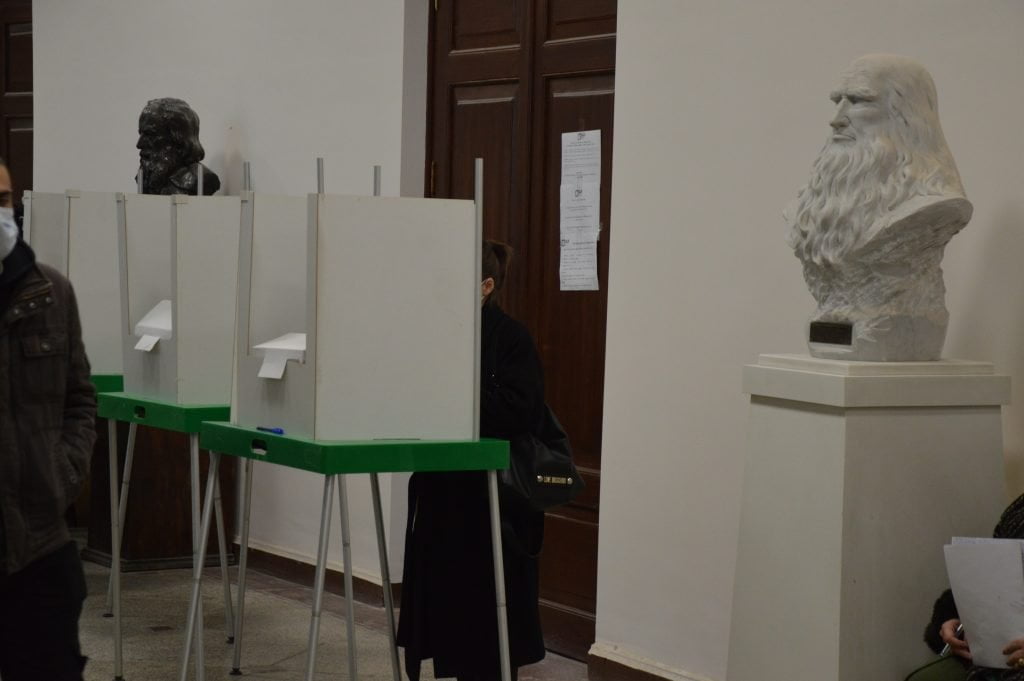29 District Election Commissions recounted the results of randomly selected 201 precincts – seven polling stations from each District – on November 1.
The process was marked by several loud quarrels between DEC members over invalid ballots, including in Batumi and Zugdidi, some of the key battlegrounds of the runoffs with narrow victories by Georgian Dream candidates.
Giorgi Kalandarishvili, Chair of the Central Election Commission, said today the recounts led to minor changes in some precincts, but have not affected the overall results.
According to the CEC Chair, results of both mayoral and majoritarian runoffs were recounted. Of the 201 precincts, mayoral runoffs were recounted in 194 and majoritarian second rounds in 33. Both races were held in some of the precincts.
Of the mayoral runoff results from the 194 precincts, the tally remained unaltered in 172. In the rest, candidates lost 31 and gained 53 votes, according to the CEC chair.
As for the majoritarian runoff results from the 33 polling stations, Kalandarishvili said the results were unaffected in 27. In the rest, majoritarian hopefuls lost seven and gained five votes, he reported.
Kalandarishvili said that although the recently amended election legislation mandated recounting 5 precincts from each district, he recommended the DECs to recount seven polling stations each.
Recounts of polling stations where vote counting on Election Day was not recorded on video are also set to take place. According to the CEC, there were overall 292 such precincts in the runoffs. DECs will have to each randomly select two of such precincts for recounts, if there were any in the district.
Further recounts are also possible through the week if the DECs, and subsequently Courts satisfy the relevant appeals.
Rows During Recounts
In Zugdidi DEC, members quarreled over a package containing 11 void ballots that had gone missing for several hours.
Opposition representatives at the DEC alleged the package, when discovered, was not sealed accordingly, and demanded the precinct results to be annulled. One of the opposition representatives told Mtavari Arkhi TV the development raised doubts on district-wide results as well.
Miranda Meskhi, Chair of the Zugdidi DEC dismissed the allegations as “subjective opinions,” arguing the seal was not voided. After reviewing the ballots, Meskhi said, only one was considered viable and was added to the vote count.
CEC also issued a statement on the incident, saying the package of the ballots was sealed properly and the votes were in the building where the recounts took place but had been misplaced when the documents were being sorted.
In Zugdidi mayoral runoff, Georgian Dream candidate Mamuka Tsotseria led the race over UNM’s Anzor Melia with 1,744 votes. According to CEC data, 54,828 voters went to polling stations in Zugdidi Municipality, and 1,345 ballots were annulled.
The recount was tense at Batumi DEC as well, marked by a loud confrontation and arguments. Media footage showed police present at the Commission, removing several observers from the premises.
One of the observers claimed some of the DEC members were biased, and supported the Georgian Dream government. According to the man, a DEC member, appointed by the UNM was not allowed to view the ballots during the recount.
An unidentified man can be seen in Mtavari Arkhi TV footage, pointing out during the DEC meeting that one of the ballots where both GD mayoral candidate Archil Chikovani and UNM’s Giorgi Kirtadze were crossed out, was allegedly counted as a vote to the former.
Invalid Ballots
According to the Central Election Commission’s data, issued on November 1, 30,095 ballots were annulled in the second round of local polls, constituting 2.96% of the total turnout – 1,015,494 voters.
CEC said that in Kutaisi and Batumi, key battlegrounds with narrow mayoral victories by GD candidates, that the share of invalid votes was 3.42% and 2.69%, respectively.
The opposition claims annulling ballots cast in favor of them was used as a method to falsify the election results.
Kutaisi mayoral hopeful Khatia Dekanoidze argued on October 31 that the total of 2,396 annulled ballots in the town was “significantly higher” than the difference giving lead to GD’s Ioseb Khakhaleishvili. According to the latest data, Khakhaleishvili received 2,240 votes more than Dekanoidze.
Dekanoidze said the opposition would demand recounts of all void ballots in the DECs, as well as in Courts.
Deputy CEC chair Giorgi Sioridze, appointed to the Commission by the opposition Lelo party, raised concerns over the issue as well. He said that besides Kutaisi, the amount of invalid ballots is higher than the difference in votes received by GD and UNM candidates in Batumi as well. In the coastal city, the GD’s Chikovani received 1,524 more votes than UNM’s Kirtadze, while 2,071 votes were voided.
“We must understand the problem of legitimacy [of election results] will arise in the public perception,” Sioridze said on November 1.
Assessing the October 30 runoffs, the U.S. Embassy stressed that complaint reviews and random recounts is now “both a test and an opportunity for the Central Election Commission and the courts, and it will be critical for these institutions to perform their duties transparently and impartially.”
This post is also available in: ქართული (Georgian) Русский (Russian)

